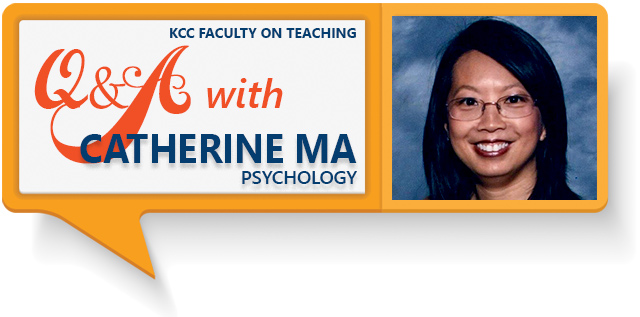KCC Faculty on Teaching
KCC Faculty on Teaching

How did you get into teaching?
I was a writing fellow for a professor at the College of Staten Island who became
an entrusted mentor and a dear friend. When my fellowship ended, she asked if I wanted
to teach as an adjunct and I was like, sure! That simple conversation was a life-changing
moment for me. It changed the trajectory of my life and my career.
What career did you imagine for yourself when you were in college?
While in college, I didn’t know what I wanted to do career-wise. I had learned about
accounting at my business high school in Manhattan and thought, ‘I’m good with numbers.
I can be an accountant.’ My mom was happy because my aunts were accountants. But then
I had another life-changing moment: I took “Introduction to Psychology” at Baruch.
I had never been so interested in any class before! I devoured everything I learned
in that class. I couldn’t wait to read the textbook and learn more about psychology.
I knew I wanted to become a psychologist, but didn’t know how to reach my end goal.
We were a family of immigrants, and I was a first-generation college student. Immigrants
and first-generation college students experience many invisible obstacles. My parents
couldn’t advise me on what majors to choose, what careers to pursue, how to become
a psychologist, etc. The first thing my mom said was that I wouldn’t make any money,
but I don’t think she really knew what a psychologist was. I spent my lunchtime at
the mid-Manhattan branch of the NYC public library and learned what I needed to do
to become a psychologist.
What do you love about teaching?
What I love most about teaching is meeting students who are like myself: immigrant
and first generation. It’s one thing to tell students you are there for them. It’s
a whole different ballpark when you share that you’ve been where they are, that you
understand their unique struggles and what they are going through, and you are here
to help them every step of the way. I try to be the professor I never had.
What’s your favorite teaching experience?
My favorite teaching experience happened in my psychology of immigration class, which
I had created to counter the negative rhetoric of a particular president-elect in
2016. I cover many topics related to immigrants and immigration in that course and
was discussing the impact of imposter syndrome, where individuals feel they don’t
belong in whatever particular field they are in, no matter how many accolades they
have earned. I shared my early experiences as an academic who felt like she didn’t
belong and how I often felt a lot of doubt in my areas of expertise. I discussed how
systemic racism in academia often targets faculty of color and ways to overcome those
obstacles. After class, one of my quieter students thanked me for sharing my experiences
and for talking about imposter syndrome because many times she had felt that she did
not belong in a college setting. We chatted as we walked to our next classes and I
told her that we all sometimes forget that we belong. It can be due to battling stressors
at the moment or when someone treats us as “lesser than,” but we all belong. Some
days are darker than others. I invited her to reach out to me when she has one of
those darker days, so I can help her remember how much she does belong. This is the
power of teaching: When you share your experiences, it gives permission for students
to share theirs – and that is where the best learning happens.
In what ways do you bring your professional experience into the classroom?
My research on maternal issues, immigrants, immigration, race, discrimination and
antiracism resonates with our students, who face many of the same issues. It makes
teaching really interesting because we have really deep conversations in class around
many of these heavy subjects. I recall one day when I was teaching about racism, which
is always difficult but such an important topic to address as it colors many experiences
our students face on a daily basis. There was an older white gentleman in my class
who stopped my lecture to share something that was on his mind. Most of the time when
this happens, it leads to an unpleasant outcome where a student will spew racist rhetoric.
This time was different. This student actually thanked me for teaching him about the
cultural genocide of residential schools, the detriment of the model minority myth,
the harassment of female faculty of color, the daily racism people of color face,
and the devastation of families of migrant workers. He said our class had changed
the way he viewed immigrants. He saw how his actions, thoughts and behaviors contributed
to the pain of immigrants and people of color. I was floored and so thankful that
I was a professor who could make such a change in that student.
What advice do you have for current students?
I want all students at KCC to be open to learning new ideas and, once they’ve learned
those new ideas, to use that knowledge to stand up against injustice whenever it rears
its ugly head. The last few years have been extremely trying for me as a Chinese American
woman but I channeled my rage to creating a new course, changing my research interests
to antiracism, helping our education majors be better prepared to address issues of
race and racism in their own classrooms, and reading books by Drs. Bettina Love and
Chris Emdin to feed my mind as well as my pedagogy. Always keep learning because that
is the only way we can empower ourselves to stand up against injustice.
